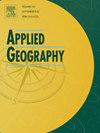Remaking the smart city through the COVID-19 pandemic: Seoul, Singapore, Taipei
IF 5.4
2区 地球科学
Q1 GEOGRAPHY
引用次数: 0
Abstract
The COVID-19 pandemic has proven to be a catalysing force for urban innovation in general, and for smart city agendas specifically, throughout the world. From the development of contact tracing technologies and the enforcement of quarantine and safe distancing measures, to the dissemination of public health information and advancement of telehealth rollouts, the promises of “smart” technologies to reveal and govern patterns of socio-spatial contact and mobility can be found at the core of effective city management during the pandemic. Arguably nowhere is this truer than in the cities of Seoul, Singapore and Taipei, where the Asian developmental state was granted a hitherto unprecedented degree of legitimacy to expand its functions. Drawing on a three-year comparative research project exploring smart city development in Seoul, Singapore, and Taipei and beyond, we explore how the COVID-19 pandemic catalysed urban innovation and reified the importance of smart city projects for effective urban management during public health crises. At the same time, we argue that the catalysing effects of the pandemic led to the creation and extension of “hyper-smartness” throughout the micro-geographies of everyday life, overreach by the state in response to the opportunities for unchecked urban innovation, and the forging of new society-state relations in response. Evidence suggests that recognition of the successes of, and backlash against, technology-enabled urban management has since contributed to the remaking of the smart city in/and the Asian developmental state in the post-pandemic era.
在新冠疫情中重塑智慧城市:首尔、新加坡、台北
事实证明,2019冠状病毒病大流行是全球城市创新,特别是智慧城市议程的催化力量。从开发接触者追踪技术和实施隔离和安全距离措施,到传播公共卫生信息和推进远程医疗推广,“智能”技术有望揭示和管理社会空间接触和流动模式,这是大流行期间有效城市管理的核心。可以说,这一点在首尔、新加坡和台北等城市体现得最为明显。在这些城市,这个亚洲发展中国家获得了迄今为止前所未有的合法性,可以扩大其职能。通过在首尔、新加坡和台北等地开展的一项为期三年的智慧城市发展比较研究项目,我们探讨了2019冠状病毒病大流行如何促进城市创新,并证明了智慧城市项目对公共卫生危机期间有效城市管理的重要性。与此同时,我们认为,大流行的催化作用导致了“超智能”在日常生活的微观地理领域的创造和扩展,国家为应对不受限制的城市创新机会而过度扩张,以及作为回应的新的社会-国家关系的形成。有证据表明,对以技术为基础的城市管理成功的认可和反对,为后大流行时代亚洲发展中国家的智慧城市重塑做出了贡献。
本文章由计算机程序翻译,如有差异,请以英文原文为准。
求助全文
约1分钟内获得全文
求助全文
来源期刊

Applied Geography
GEOGRAPHY-
CiteScore
8.00
自引率
2.00%
发文量
134
期刊介绍:
Applied Geography is a journal devoted to the publication of research which utilizes geographic approaches (human, physical, nature-society and GIScience) to resolve human problems that have a spatial dimension. These problems may be related to the assessment, management and allocation of the world physical and/or human resources. The underlying rationale of the journal is that only through a clear understanding of the relevant societal, physical, and coupled natural-humans systems can we resolve such problems. Papers are invited on any theme involving the application of geographical theory and methodology in the resolution of human problems.
 求助内容:
求助内容: 应助结果提醒方式:
应助结果提醒方式:


